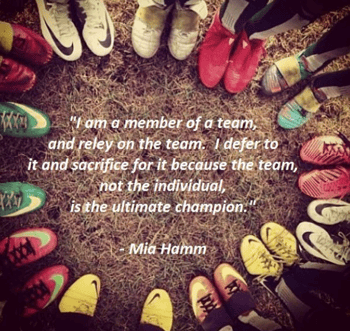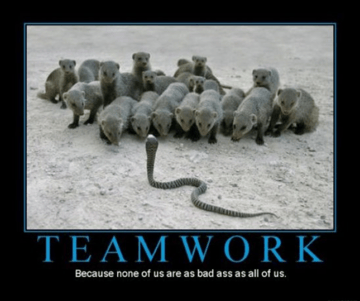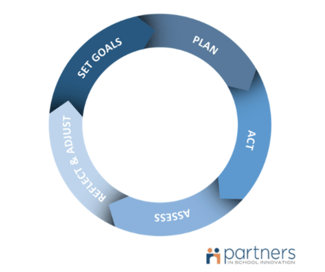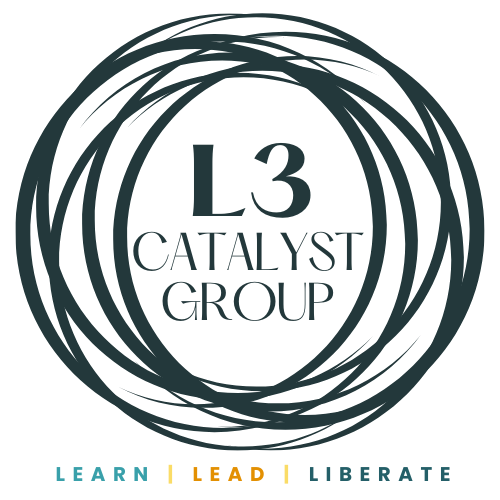Healthy teams are the lifeblood of organizations. How much do we invest in them?
Teamwork can be so hard. On teams, we truly see each other: the good, the bad, and the ugly. A million barriers get in the way of strong teamwork, and dynamic teams don’t happen by accident.
What are some characteristics of a strong team
that you’ve been a part of?

Mia Hamm, an internationally famous US
Soccer player, shares this about teamwork:
I am a member of a team and rely on the team. I defer to it and sacrifice for it because the team, not the individual, is the ultimate champion.
It wasn't until I worked at Partners in School Innovation that I began to deeply understand and apply critical components of strong teams. With our home office in San Francisco’s Dogpatch neighborhood, our team supported district, school, and teacher teams in K-12 schools across the United States, from San Francisco to Philadelphia. As we studied and applied research-based components of strong teams, we held up the mirror and worked doggedly and imperfectly to apply these practices internally as well. It is no coincidence that they were the most dynamic teams I have experienced. We believed that students’ race and zip code should not determine their opportunities or trajectory in life. Together we flipped the script and accomplished together what we could never have done alone. It was rare and precious.
What amazing teams with brave goals have you been a part of?
I grew up in a town where boy's basketball ruled. As a kid, I was afraid of not living up to the high expectations of team sports. Across town conversations after games replayed the beautiful three-pointer, the amazing assist, the steal that turned the tide, and the players' public mistakes. Instead of joining team sports, I unconsciously chose a sport where I would be somewhat invisible: cross country. I was petrified of public failure, and frozen in the face of perfection's inaccessibility.

Mr. Blankespoor, one of my high school teachers, made sure the cross-country runners were noticed, too, for our team and individual accomplishments. He would read stats from recent cross-country meets and acknowledge us personally. I shied away from being noticed, and his recognition felt amazing. Celebrating others’ accomplishments is a significant component of healthy teams.
As a teenager, I shied away from team sports because of my fear of disappointing others. As an adult, working on professional teams, I learned the beauty of mutual accountability and the synergy that can result when we:
- Know our individual and team strengths
- Aren't frozen by our fear of weaknesses or failure
- Fiercely shut down the perfectionism myth
- Put the team first
- Grow spaces of psychological safety
We are interrelated. Our accomplishments do not occur in a vacuum, whether we are serving on a sports team, a board of directors, a work team, or a faith community committee. Teams can be the bane of our existence or a reason we love life.
How many teams would you estimate that you've worked on? How many of them have been thriving, energizing, dynamic groups of people working toward a common goal?
I spend hundreds of hours a year observing, facilitating, co-designing, and supporting teams. Numerous bestsellers will claim quick fixes for teamwork challenges. There is no secret to strong teams, no quick fixes. These best practices take commitment, time, effort and synergy, but they won't disappoint.
 Embed continuous improvement processes (CQI). My favorite is the Results-Oriented Cycle of Inquiry (ROCI) from partners and school innovation.
Embed continuous improvement processes (CQI). My favorite is the Results-Oriented Cycle of Inquiry (ROCI) from partners and school innovation. - Utilize tools such as Enneagram or DiSC that increase self and mutual understanding.
- Support individuals and teams to analyze their strengths and growth areas. The stages of team development model helps analyze current state, figure out what may be holding the team back, and set concrete steps toward transforming.
- Understand, value, and practice psychological safety.
- Celebrate wins. We are missing out if we don’t stop to celebrate.
- Encourage voicing differing opinions, thoughts, observations, and ideas. These are critical to inclusiveness.
- Identify your team's purpose. Keep it front and center. Don't assume it's clear to all.
- Create a team charter, also known as team working agreements. These are highly underutilized yet very effective when used as living, breathing documents.
What would you add to this list?
Fellow leaders and learners, I wish you courage and resilience for the journey. Go team!
Peace to you,


What I’m Reading & Watching
Regarding This Topic:
- Partners in School Innovation - What We Do (explains ROCI)
- Why Diverse Teams Are Smarter by David Rock and Heidi Grant - Harvard Business Review
- Brené with Priya Parker on The Art of Gathering - Unlocking Us (explains the critical nature of purpose statements)
- Group vs team: What’s the difference? by Bianka Nemeth - SessionLab
- The 5 Stages of Team Development by Deirdre Scully - teamwork.com
- High-Performing Teams Need Psychological Safety. Here’s How to Create It by by Laura Delizonna - Harvard Business Review

Questions for Consideration
Regarding This Topic:
- What have you found that’s integral to teamwork that wasn’t mentioned in the article?
- Does your team intentionally focus on each of these CQI steps found in the Results-Oriented Cycle of Inquiry model? Which component do you love the most? Which do you avoid?
- What was the most dynamic team that you’ve been on? Why? What made it special?
- Are you investing as much into the team you are serving on, as the team you are leading? Why or why not?

Catch-up on Previous
Leadership & Learning Letter Topics:
Tags:
diversity, purpose statements, interdependence, learning, continuous quality improvement, stages of team development, teamwork, Partners in School Innovation, leadership, group vs. team, teams
July 14, 2021




Comments